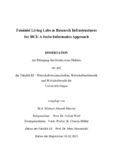Zitierlink:
http://dx.doi.org/10.25819/ubsi/10268| DC Element | Wert | Sprache |
|---|---|---|
| dc.contributor.author | Ahmadi, Michael | - |
| dc.date.accessioned | 2023-02-14T13:14:50Z | - |
| dc.date.available | 2023-02-14T13:14:50Z | - |
| dc.date.issued | 2023 | de |
| dc.description.abstract | Many IT organizations still struggle to integrate female professionals, and masculinity influences their cultures as well as the operations of design teams. As a result, technology design not uncommonly excludes users or reinforces gender stereotypes. Feminist HCI as a theoretical orientation to HCI research sensitizes researchers regarding questions such as whose concerns and interests are considered, whose voices are heard, and how stereotypes are inscribed into technology artifacts. However, academic debates did not impact IT practice to a substantial degree. Ergo, how to translate the broad commitments of feminist HCI into a pragmatic, context-sensitive research infrastructure in real-life environments remains to debate. This thesis contributes to present debates on feminist HCI, giving methodological guidance for analyzing and sharing gendered practices in IT organizations, promoting long-term reflection on women’s experiences regarding technology usage and production in the process. It argues that practice theory, expressed in a Practice-Based Design notion, offers a suitable solution to engage with such issues in real-life environments and proposes feminist Livings Labs as research infrastructures. Living Labs in the tradition of the PRAXLABS approach of the ‘Siegen School,’ where feminist HCI informs the research activities, offers unique qualities to do engaged research for and with women. They provide long-term collaboration, a broader picture from a range of stakeholders, grounds for exchange, and co-design possibilities for organizational change. I will report from experiences of setting up and managing a long-lasting feminist Living Lab in Germany during a three-year project called ‘GEWINN.’ Collaborating with six male-dominated IT organizations and additional stakeholders, the lab allowed to engage with everyday gender practices and effectively co-design possible solutions for problems rooted in real-life practice. Throughout this thesis, I will lay out how a feminist epistemology and methodology shaped the setup of the feminist Living Lab to match ambitions for emancipation and social change. Concrete (design) case studies will present how the activities in the lab were established and maintained. My experiences shed light on the unique characteristics of a feminist Living Lab as well as the opportunities and challenges that arise when conducting such engaged, value-driven research. Opportunities involve engaging with gender practices and building trustful relationships over a longer period of time, as well as fueling emancipatory actions. Challenges mainly include managing participation, addressing the sensitivity of the context and power hierarchies by cultivating safe spaces, the role of the researcher, and sustainability issues. In addition, based upon cross-comparisons with other Living Lab projects, I will show how my experiences can, at least partially, be transferred to other sensitive research settings concerned with so-called marginalized, potentially vulnerable, or less privileged populations, and vice versa. I will also offer reflections regarding applying the PRAXLABS framework as an infrastructural and analytical orientation. My insights might serve other scholars as guidance to conduct value-driven Living Lab work with marginalized populations in sensitive contexts in general and with an explicit feminist stance in particular. | en |
| dc.description.abstract | Viele IT-Organisationen tun sich immer noch schwer, weibliche Fachkräfte zu integrieren, und Männlichkeit beeinflusst sowohl ihre Kultur als auch die Arbeit der Designteams. Infolgedessen schließt Technologiedesign nicht selten Nutzende aus oder verstärkt Geschlechterstereotypen. Diese Arbeit leistet einen Beitrag zu gegenwärtigen Debatten über feministische HCI, indem sie eine methodische Anleitung für die Analyse und den Austausch von geschlechtsspezifischen Praktiken in IT-Organisationen gibt und dabei eine langfristige Reflexion über die Erfahrungen von Frauen bei der Nutzung und Produktion von Technologie fördert. Es wird argumentiert, dass practice theory, ausgedrückt in einem practice-based-design-Konzept, eine geeignete Lösung bietet, um sich mit solchen Fragen in realen Umgebungen auseinanderzusetzen und es werden feministische Living Labs als Forschungsinfrastrukturen vorgeschlagen. Living Labs in der Tradition des PRAXLABS-Ansatzes der "Siegener Schule", bei dem feministische HCI die Forschungsaktivitäten prägt, bieten einzigartige Qualitäten, um engagierte Forschung für und mit Frauen zu betreiben. Meine Erkenntnisse könnten anderen WissenschaftlerInnen als Anleitung für die Durchführung wertorientierter Living-Lab-Arbeit mit marginalisierten Bevölkerungsgruppen in sensiblen Kontexten im Allgemeinen und mit einer explizit feministischen Haltung im Besonderen dienen. | de |
| dc.identifier.doi | http://dx.doi.org/10.25819/ubsi/10268 | - |
| dc.identifier.uri | https://dspace.ub.uni-siegen.de/handle/ubsi/2461 | - |
| dc.identifier.urn | urn:nbn:de:hbz:467-24614 | - |
| dc.language.iso | en | de |
| dc.subject.ddc | QGTX | de |
| dc.subject.other | Living lab | en |
| dc.subject.other | Gender | en |
| dc.subject.other | Feminist research | en |
| dc.subject.other | Feminist HCI | en |
| dc.subject.other | Socio-informatics | en |
| dc.subject.other | Practice-based design | en |
| dc.subject.other | Methodology | en |
| dc.subject.swb | Mensch-Maschine-Kommunikation | de |
| dc.subject.swb | Sozioinformatik | de |
| dc.title | Feminist living labs as research infrastructures for HCI: a socio-informatics approach | en |
| dc.title.alternative | Feministische Living Labs als Forschungsinfrastrukturen für HCI: ein Socio-Informatics-Ansatz | de |
| dc.type | Doctoral Thesis | de |
| item.fulltext | With Fulltext | - |
| ubsi.contributor.referee | Wulf, Volker | - |
| ubsi.date.accepted | 2023-02-01 | - |
| ubsi.organisation.granting | Universität Siegen | - |
| ubsi.origin.dspace5 | 1 | - |
| ubsi.publication.affiliation | Fakultät III - Wirtschaftswissenschaften, Wirtschaftsinformatik und Wirtschaftsrecht | de |
| ubsi.subject.ghbs | 650 | de |
| Enthalten in den Sammlungen: | Hochschulschriften | |
Dateien zu dieser Ressource:
| Datei | Beschreibung | Größe | Format | |
|---|---|---|---|---|
| Dissertation_Ahmadi_Khaveh_Michael.pdf | 2.74 MB | Adobe PDF |  Öffnen/Anzeigen |
Diese Ressource ist urheberrechtlich geschützt. |
Seitenansichten
535
checked on 03.04.2025
Download(s)
1.047
checked on 03.04.2025
Google ScholarTM
Prüfe
Prüfe
Alle Ressourcen in diesem Repository sind urheberrechtlich geschützt, soweit nicht anderweitig angezeigt.

